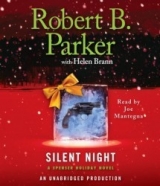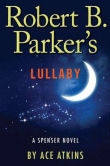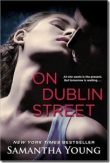
Текст книги "Silent Night"
Автор книги: Robert B. Parker
Соавторы: Helen Brann
Жанры:
Криминальные детективы
,сообщить о нарушении
Текущая страница: 3 (всего у книги 9 страниц)

THE NEXT DAY Hawk and I drove to Weston, where both the old and new rich had big horse farms and eighteenth-century houses or McMansions and at least twenty acres of land each to keep them on, all just fifteen minutes from downtown Boston. We were sitting in my car, off the road but within view of the Alvarez compound. Snow sifted down and veiled the pastures before us. We had coffee and donuts. The heater was on, and it was still cold inside.
I had done a little research on Alvarez. A Google search and a short conversation with Susan, but it still qualified as research. Google told me that Juan Alvarez graduated from the London School of Economics. Worked in London for a few years at Morgan Stanley. There was an early marriage to a British woman and a divorce five years later. No children. Then the bio stopped and picked up again in Boston. His import/export firm’s success was noted, and his philanthropic interests included everything from large donations to the Boston Symphony to Dana-Farber research to Meals with Heart.
“Why do you suppose Juan Alvarez lives at the hotel Taj instead of getting himself a swell condo at One Charles or someplace more befitting his image?” I said.
“Somehow a hotel more loose,” said Hawk. “You come, you go. No one notices or cares. Plus he got this fine farm.”
“Good point,” I said. “Why have a place in Boston at all?”
Hawk yawned. “Pied-à-terre, babe,” he said. “All rich white boys got a pied-à-terre in the big city. Place to do the things you don’t want no one to know about back on the farm.”
“And somehow he became Father Flanagan and Santa Claus and a prince of Boston high society all rolled into one. In most big cities, all you need is money to give to the key charities. They have to put you on the board. Before you know it, as long as you don’t eat your peas with a knife, you’re invited to all the best parties,” I said.
“I prefer my peas on a knife,” Hawk said.
“They tend to frown on switchblades at fancy dinner parties,” I said. “You’d probably feel out of place.”
“Not the only reason I’d feel out of place,” Hawk said. He looked out toward the Alvarez house. “We have a plan here? Or we just gonna sit here till we run out of gas.”
“No plan,” I said. “But we do have choices. One, we sit and watch, or two, move and stir things up. Right now we’re sitting and watching.”
“How ’bout I take a nap till we get to the move-and-stir-things-up part of the program?”
“Suit yourself,” I said. “But don’t expect me to share all the important clues with you if I find them while you’re asleep.”
“Already know what you gonna learn. Gonna learn when the mail gets delivered. Gonna learn how long it take that icicle on the roof gutter to melt. Ain’t gonna learn nothin’ we need to know, like what goes on over there and how many guns they got on the place. They could be building weapons of mass destruction in the side yard and we ain’t gonna learn that, sittin’ where we are.”
I sipped my coffee and looked at the big colonial house. There was a Jeep parked off to the side of a long circular driveway. I could see the Christmas wreath on the front door. I could see the icicle hanging from the roof gutter. I couldn’t see any signs of life or activity. Knowing when the mail got delivered wasn’t going to help me. And that icicle wasn’t going to melt for a long time.
“Okay, you win,” I said. “Saddle up, Kemosabe. Let’s go look at some horses.”
I drove slowly down the road that led to the smaller houses on the property, where I supposed employees lived. At the end of the road I could see a large barn and what looked like a long, low stable. There were fences with those three black slats you see in photos of Kentucky horse farms. Maybe all horse fences had them. An emblem.
It was early afternoon and no one was at home.
The snow was thick now, and blurred my vision. I squinted.
In front of us in the middle of the dirt road, looking like a snow bunny, was a short, squat man holding a rifle. It was pointed at my head. I stopped the car, pulled the Beretta from my shoulder holster, and dropped my gun hand to my side. I knew Hawk would be doing the same.
The man held his rifle on me and approached my side of the car. I rolled down the window.
“Excuse me,” I said. “Is this the way to Pottery Barn?”
It took a bit longer than I would have expected for him to comprehend what I was saying. I could see him almost mouthing the words until they sunk in.
“There’s no fucking Pottery Barn out here, asshole. This here is private property, and you’re trespassing.”
“That’s what I thought,” I said, “but try telling that to Clarabelle.”
The man leaned in to look into the car and squinted at Hawk. Hawk slowly turned his head toward the man and flashed an even smile.
“Who the hell is Clarabelle?” the man said.
“The navigation system in my car,” I said. “I like to give a name to the voice that gives the directions. Makes it more personal, don’t you think?”
Rifle Man was mouthing the words again. I waited.
“Listen, smart-ass. This here is private property, and you’re trespassing.” He repeated the lines, as if he had been trained to say them, which was probably the case. Those words, backed up by the gun, were probably enough to scare off most interlopers.
“Okay,” I said. “So it’s not a Pottery Barn. What goes on out here? Bird sanctuary?”
He brought the gun back up level with my head. I pulled the Beretta up to my lap.
Someone came out of the cottage to my left. A short, dark woman with a child. She spoke in Spanish to the man with the rifle. I understood enough to know her child was sick and that she needed a ride to the emergency room.
Rifle Man became flustered and annoyed. He tried to keep his gun trained on me while he barked back at the woman. Clearly, multitasking wasn’t his strength. I couldn’t understand all that he was saying, but his tone didn’t convey sympathy. The woman started to cry, and there was desperation in her voice that required no translation.
“You understand this?” I said to Hawk.
“Woman’s baby be really sick. She say he need to get to the hospital right away. He say that too bad, he ain’t bringing them to the hospital, don’t care if the baby live or not.”
The woman rushed closer to the man, pleading and wailing and trying to show him her sick child. He pushed her away, and she and the baby fell to the ground.
Hawk opened his door and got out of the car.
“Hey! Hey!” Rifle Man swung his rifle over the top of the car toward Hawk. “Stop right there or I’ll shoot. This here’s private property and you’re trespassing.”
Hawk ignored him and walked around the car to the woman and her baby. As Rifle Man swiveled to train his gun on Hawk, I pushed open my car door and slammed it into his left side. He collapsed with a grunt and the rifle flew from his hands, landing a few feet away. I stepped from the car. As Rifle Man tried to stand, I leaned in and kicked him in the stomach. He fell to the ground and rolled onto his back. I stood over him with my Beretta pointed at his nose.
“Okay,” I said. “Here’s the deal. We’re taking this young woman and her baby to the hospital. You’re going to pull yourself together, and in two hours you are going to drive to the hospital and pick them up. Do you understand me?”
Rifle Man was having an even harder time with comprehension. I waited for him to mouth the words and then digest them. Finally, he nodded.
“You have dented my car door, and worse than that, you’ve annoyed us. Being men of goodwill in this holiday season, we’re willing to forgive you. But if you try to stop us, or if you cause any harm to this woman or her child, I am going to come back here and extract my insurance deductible from you. Do you understand that?”
Again he mouthed the words. He seemed to have problems with “extract.” I tried again.
“If you shoot at us, or if you harm the woman or her baby, I will come back here and hurt you. Do you understand?”
Fear materialized on Rifle Man’s face, and this time he nodded without having to do much thinking. He shouted something in rapid-fire Spanish to the woman.
“Hawk?” I said.
“He tell our new friend here that he’ll come by the hospital in two hours to check on her and the bambino. He also tell her he hope the baby be okay.”
I holstered my Beretta, walked over to the rifle, cracked open the barrel and collected the shells and put them in my pocket. Then I grabbed the rifle by the barrel with both hands and flung it over the car and far into the trees.
Hawk had led the woman and the baby over to my car and put them in the backseat. I got back in the car, did a three-point turn, and drove slowly back out the dirt road. In my rearview mirror, I could see Rifle Man slowly getting to his knees and looking dumbly at our taillights.
We reached the open highway, and she said, “A la derecha.” I could see in the rearview mirror that she was young, maybe twenty. She wore her hair in a kind of bun, and her winter coat was patched and threadbare. The baby wore a good-quality parka and was nestled down in it, asleep.
Hawk said, “Cómo se llama?”
“Martita. Mi hijo se llama Juanito. Tiene mucho fiebre.”
“Habla inglés?” Hawk said.
“Sí. Un poco.” She smiled and I could see she was missing a front tooth and the rest of them looked brown.
“Do you know Carmen?” I said.
“Sí, sí! Es un angel!” She smiled some more. “She is my amiga.”
“Your friend. And Slide?” I said.
“Sí. She takes care of him.” She smiled and shook her head slowly. “He is like a little brother to her.”
“Do they live near you?” I said.
“Sí, sí.” She put her hands together.
“Carmen lives with you, not at the big house?” I said.
“Sí, sí.” She smiled some more. “Por uno o dos días.
“Ah! A la izquierda!” she added.
“Left,” Hawk said.
Halfway down the block in a storefront was a medical building. A line of people, looking miserable in the cold, waited to get inside. Above them, the Christmas decorations, big red bells and candy canes and sleighs with Santa in them, were hung along the lines between the telephone poles. Hawk got out with Martita. She was headed to go to the end of the line, but Hawk took her under the arm and marched her into the building. I thought I would let him take care of this situation. He could be very convincing when he wanted to be. I watched the line of people—men, women, and children, all sick with something—patiently waiting to get medical attention, at a place that looked nothing like Mass General.
Hawk returned, quicker than I would have thought.
“I told them I was President Obama’s cousin,” he said.
“See how well the health-care system works,” I said, “when you give it a chance.”

I HAD PROMISED JACKIE I’d drop by Street Business to give his charges a boxing lesson. We agreed on a time that fit my hectic holiday schedule, and I had imposed upon Henry Cimoli to scrounge up some used equipment for me to bring. Because Hawk was curious about Street Business, I invited him along. I also invited him because I couldn’t carry all the equipment by myself.
On the way to the house on Curtis Street, Hawk said, “You going to a lot of trouble for this Jackie fellow. Christmas spirit?”
“Maybe. I remember my father and uncles teaching me how to box when I was about ten. Learned a lot. Not just how to move my feet.”
Hawk was silent. After a moment or two he said, “You know Jackie’s kids, they different from you. Come from a different place.”
I glanced at Hawk. He was looking at the road ahead, expressionless. “Worth a try,” I said.
Jackie had cleared the exercise room and put down some canvas on the floor, flat and neat and secure. When Hawk and I arrived, he and four of the boys were waiting for me. They all wore sweats and high-top sneakers.
I introduced Hawk and Jackie. Jackie offered us both coffee, which we declined.
“How goes Street Business?” I said. “Everything quiet?”
“Since I came to see you,” Jackie said.
“The Christmas lull.”
Jackie turned to the boys. “This is Mr. Spenser,” he said, “and his friend Hawk. They’ve offered to show you boys some basics of boxing. Please introduce yourselves and welcome our new friend.”
The tallest boy, but not necessarily the oldest, stepped forward. “I’m Teddy,” he said. He had red hair, freckles, and pale blue eyes, and was thin as paint. We shook hands.
Next was Mike. A pudgy kid with a wide grin. “We heard about you, Mr. Spenser. Jackie says you’re a tough guy,” he said.
“Ram tough,” I said, “but I use my power only for good.”
There was Pedro, one of Juan’s immigrant kids, who had a baby face and looked about ten, and Carl, who was the oldest and had started to shave. He sported a small scraggly beard and lank blond hair.
Carl’s expression conveyed either disdain or a severe stomach cramp. “I know how to box already,” he said.
“Good,” Jackie said. “Then you don’t have to stay. No need to waste our guests’ time.” His rebuke was friendly but firm. Carl stayed.
Hawk and I unloaded the used mitts, gloves, and headgear from Henry, as well as the mouth guards from a local sporting goods store. Jackie passed out the equipment while I surveyed the room. There were two bags attached to opposite walls, one a heavy bag and the other a speed bag. Some jump ropes. Some hand wraps strung over the back of a bench.
“Okay,” I said. “Any of you do any running? Or any other exercise?” I said.
“Naw,” Mike said. They all shook their heads. “We ride our bikes, that count?” Teddy said.
“Sure. But boxing takes both strength and endurance, maybe more than any other sport. You have to be in good shape,” I said. “So the first thing we’re going to do today is run in place and jump some rope.”
Carl sneered. “Jump rope’s for girls,” he said.
Hawk looked at him. “Jump rope’s for athletes,” he said.
I handed out the ropes. One to Teddy, one to Pedro, and one to Hawk the athlete. “Mike, you run in place with me,” I said. “We’ll try five minutes. Come on, Jackie, you up for this?” He grinned at the challenge and grabbed a jump rope.
Five minutes later the three boys were red-faced and puffing. “You guys ain’t even breathing hard,” Mike said. “Neither’s Jackie.”
“We’ve had a lot of practice,” I said. “If you want to box, you need to do this every day. And look, the fun part.”
Hawk and I took the hand wraps and put them on the boys’ hands in figure eights, fitting them snugly on their small hands. Then we put mitts on them and took them over to the speed bag. “Try hitting it, any way you want, just to get the feel of it,” I said. “Take turns.”
“You box?” I said to Jackie.
“A little,” he said. “But I can mix it up with them anytime. Today’s for the professionals to show their stuff.”
The kids had stepped up to the speed bag one by one, and flailed away, missing it most of the time, laughing and jabbing one another in the ribs, and dancing around the bag. Carl watched. He had put on wraps. He went over, picked up a pair of old leather boxing gloves, and went to the heavy bag. He stepped up to it and whacked it like an amateur, but with some strength. I held the bag for him. He went at it again.
“Good,” I said. “Next we’ll work on your footwork.”
“Don’t need to,” Carl said. He was starting to breathe heavily. “Footwork’s fine.”
I pushed the heavy bag slightly, and Carl’s next punch hit the side and brushed off. His momentum carried him forward, and he tripped. He staggered through the punch and stumbled to the floor.
The others kids stopped and stared at him. Pedro and Mike stifled laughs in their gloves.
“Hey!” Carl said. “That’s not fair. You tricked me.”
“You don’t have to worry about footwork if you’re hitting something that’s stationary,” I said. “Problem with people is they tend to move. If you’re going to box something that has feet, you’ve got to have good footwork.”
I put my hand down to help him up. He pushed my hand away and pulled himself to his feet.
“Okay,” I said. “Let’s try it again. This time I promise I won’t move the bag. We’ll work on footwork next time.”
Carl ripped into the bag with a sullen fury. After a few punches his pace slowed, and in less than a minute he was spent.
Hawk and I worked with the other three kids for the next half-hour. When they finished, the boys piled the equipment back into the boxes.
Pedro said, “Will you return and teach us some more?”
We nodded.
“In the meantime,” I said, “take good care of that equipment. It’s yours now.”
The boys and Jackie beamed. “Say thank you to Mr. Spenser and Hawk, boys. That’s very generous of them.”
The boys responded with a uniform singsong chorus of thanks. Even Carl managed a grudging “Thanks, man.”
Jackie smiled, then turned to the boys. “When you are boxing, boys, your hands are your weapons. You need to know how to use them, and when. Mastering any weapon is about discipline and control. That’s it for today. You guys go get something to eat,” Jackie said.
The boys bolted in the direction of the kitchen. Carl’s elbows put him in the lead.
“Sorry about Carl,” Jackie said. “He’s a hard nut to crack. Been here about six months. He served time as a juvenile for breaking and entering, vandalism, car theft. You know. Pretty much kid stuff.”
“Just enough to get thrown in with guys tougher than him,” Hawk said.
Jackie looked at Hawk and nodded. “You got it. All these kids got a story. The Mexicans came over the border in Arizona being shot at; some of them saw a mother or father killed in front of them and somehow got away and reached relatives and made their way east. You take a kid like Teddy?”
“The tall one,” I said.
“Yeah. Good kid. But both parents were drunks and they dumped him. Just left him at an orphanage in Philadelphia. He had been there most of his life until he ran away and we found him. Or he found us is more like it. There’s a network of these lost street kids from city to city, and they hear about safe places to go. Some want to get there, some have already given up. These kids are so beaten up by living by the time we get them, I spend a lot of time just getting them to trust me.”
“What give you the idea to start Street Business?” Hawk said.
Jackie looked at Hawk. “I’ve always wanted to be like my big brother, Juan. A big success. Great with women. Lots of money. But it didn’t turn out that way for me. I tried a lot of things. Gambling. Selling cars. I wasn’t good at any of them. But I always liked kids. And I was lucky. My parents were good to us. As you know, my mother still lives in Lawrence, and my sisters and brothers all live nearby. Except, of course, Juan.”
“Yes, of course, Juan,” I said.
“You don’t like my brother?” Jackie looked surprised.
“I don’t know him well enough to like him or not like him. I’ve only met him once. He does seem like an international man of mystery.”
“He’s always been good to me, Spenser. And to our family. He has been generous with the fruits of his success. Without him, these kids would just be more sad stories out there on the streets. Because of Juan, they at least have a chance.”
“And because of you,” I said. “Probably more than Juan.”
Jackie shrugged as he stood. “I got to get a shower and do some chores. Thanks for coming by today. Both of you. The kids loved their boxing lesson.”
A stocky guy about my size was leaning on the wall just inside the front door, filling the space occupied by Joe on my last visit. He was wearing gray sweatpants over running shoes, and a New England Patriots sweatshirt with a matching slouch cap. He straightened up as Hawk and I approached.
“You security?” I said.
His lipped curled to form something that could have been a grin or a sneer.
“Security. Bus driver. Truant officer. Handyman,” he said. “Anything they need around this hellhole.”
“Let me guess,” I said. “You didn’t volunteer for this duty.”
“Christ, no.” The guy gave a short snort. “Volunteer.” He spat out the word like it described an unnatural act. “I’m minding my own business out in the suburbs, the boss says, ‘Frankie, get your ass into Boston and keep my little brother from falling into the Charles.’ The boss speaks, I jump. So here I am.”
“The boss would be Juan Alvarez?”
Frankie stiffened and pulled himself away from the wall.
“Who wants to know?”
“My name’s Spenser. This is Hawk. Jackie asked me to help find out who’s been causing problems for Street Business.”
Frankie relaxed and resumed his job holding up the wall.
“Lucky you. Heard about you. Super-dick come to save the day. Good luck.”
I let that pass. “What can you tell me about what’s been going on around here?”
Frankie rolled his eyes and exhaled elaborately. “Nothing going on around here. A few kids get their lunch money stolen on their way home from work.” He rallied himself from the wall to put air quotations around “work,” then settled back again. “Some get in fights and get knocked around a little. Chickenshit stuff.”
“Still,” I said. “Hard to believe, with all the crack security around here.”
He straightened up again and leaned into my face. “Screw you, Jack,” he said. “It all happens out on the street somewhere. Never had a problem in the yard or in the premises.”
“It’s Spenser,” I said. “And I think you mean ‘on the premises.’ Any idea who might be harassing the kids?”
Frankie folded his arms across his chest. I had a feeling we were experiencing his entire repertoire of poses.
“Don’t know, don’t care. Kids go out on the city streets and some get into fights. That’s a big fucking news flash. Especially with these turds. This ain’t exactly a collection of altar boys.”
“I’m sensing you’re not a big fan of Street Business.”
“You think? Best thing anyone could do is run these pissants off and take a wrecking ball to the place. Or maybe lock them in here and bring in the wrecking ball.”
“So you’re not a believer in Jackie’s mission to help kids?”
Frankie shook his head. “Guy’s got his head up his ass. He thinks if he clothes and feeds street kids they’ll grow up and save the world. Christ, these kids are animals. You dress ’em up and give ’em three squares a day, they’re still animals. Just as likely to kill Jackie in his bed as anything.”
“So you just give up and let them be animals?”
“You let their families take care of them. That’s the way I was brought up.”
“And if they don’t have family?” Hawk asked. Until then he had been silent, and his question startled Frankie.
Frankie recovered. “That’s bullshit. Everyone’s got family. If the parents aren’t around, there are aunts and uncles and grandparents. And if there aren’t any relatives, send ’em back where they came from.”
“Your boss aware of your enlightened views of his brother and his work?” I said.
“You ask him straight, I bet he’d agree with me. Juan Alvarez is one tough sonovabitch. He started with nothing and clawed his way to the top. No one gave him any handouts. He had his family and himself, and that’s it. And family is everything to Mr. Alvarez. He looks out for his own. I seen the way he supports his mother and his brothers and sisters. Especially Jackie.”
“Especially Jackie?”
“Yeah.” Frankie shook his head. “From what I hear, Jackie’s the black sheep. Always getting into trouble. Mr. Alvarez promised his mother that he’d take Jackie under his wing, straighten him out. When Jackie decides he wants to start this Romper Room, Mr. Alvarez sets him up and supports him, just like he promised Mama.”
“Doesn’t Alvarez support a bunch of charities around Boston? Street Business seems to fit with that.”
Frankie unfolded his arms and put them behind his back. Experimenting with a new pose. Conversational Frankie. Daring.
“Mr. Alvarez donates to groups that have been around a long time, that have a track record. Places that do things you can point to. Stuff connected to his businesses. Lot better places to put money than this rat hole.”
“You ever consider following the kids around, try to find out who’s bothering them?”
“Yeah, right.” Frankie flashed the might-be-a-sneer, might-be-a-grin look at Hawk. Hawk showed nothing. The look disappeared. “I do what Mr. Alvarez tells me to do. No upside in freelancing.”
“Might help you to move around a little bit,” I said. “You stand next to the door too long, people might mistake you for a coatrack.”
Frankie balled his fists, took a step toward me, then looked at Hawk and reconsidered. We walked out.








